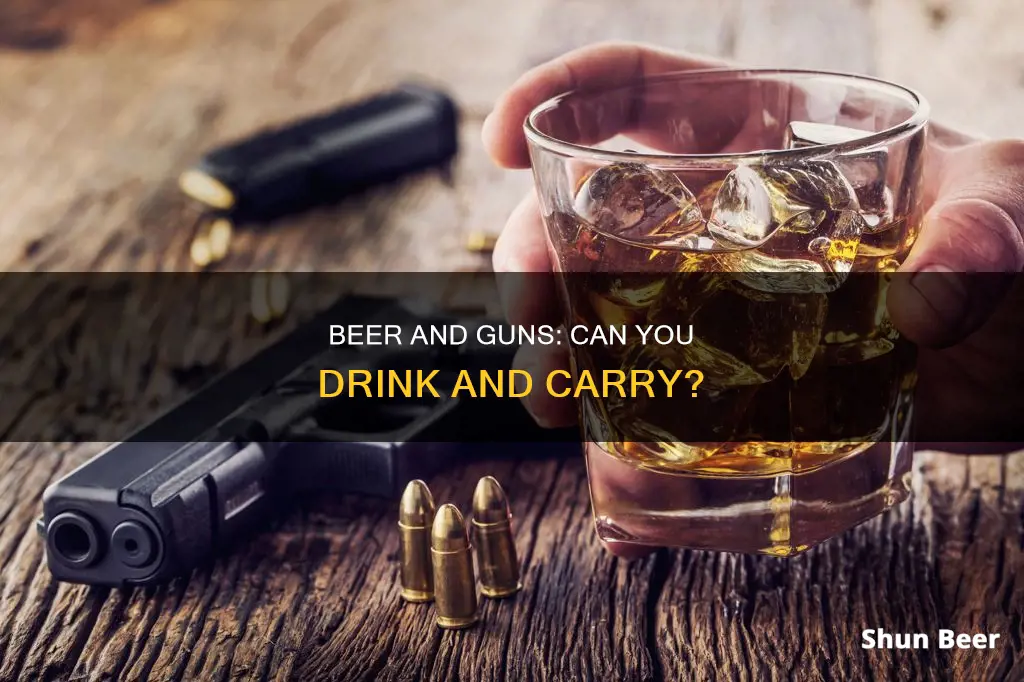
Drinking and carrying a concealed weapon is a topic that has been widely discussed, with varying opinions and official stances. While some states have specific laws prohibiting the consumption of alcohol while carrying a concealed firearm, others leave it as a grey area, and a few even allow it. However, it is important to note that even in states where it is not explicitly prohibited, carrying a firearm while intoxicated can lead to permit revocation and legal consequences. Ultimately, it is advisable to refrain from drinking alcohol when carrying a concealed weapon to avoid any potential risks and legal complications.
| Characteristics | Values |
|---|---|
| Can I drink beer with a concealed carry permit? | It depends on the state law. Some states ban any consumption of alcohol while carrying a concealed weapon, some prohibit carrying when a person is intoxicated or under the influence, and some do not address this issue in state law. |
| Drinking and carrying a concealed weapon | It is generally advised against drinking and carrying a concealed weapon. Even if it is legal in your state, it can complicate your defense in court if you ever need to use your firearm for self-defense. |
| State laws | Alabama allows carrying a concealed firearm in a restaurant that serves alcohol but prohibits drinking. In Michigan, it is illegal to consume alcohol and possess a concealed handgun on your person or in your vehicle. Texas prohibits carrying a handgun while intoxicated. |
What You'll Learn

State laws on drinking with a concealed carry permit
State laws vary on drinking with a concealed carry permit. While some states don't address this issue in their statutes, others ban any consumption of alcohol while carrying a firearm. Some states prohibit carrying a firearm when a person is intoxicated or under the influence, while others ban carrying while consuming alcohol and when intoxicated. The definitions of what constitutes intoxication or being under the influence also differ between states.
In most states, it is illegal to carry a firearm in establishments that serve liquor, including restaurants and clubs, even with a concealed carry permit. These prohibitions apply regardless of whether the individual is consuming alcohol. Violating firearms laws related to alcohol can result in serious fines and jail time. For example, Ohio considers possessing a firearm in a bar a fifth-degree felony, and the penalty increases to a third-degree felony if the weapon is concealed. New Mexico classifies this offence as a fourth-degree felony, while New York imposes class E felony penalties.
Some states impose specific penalties for carrying a firearm while under the influence. In Oklahoma, a conviction leads to a six-month suspension of a handgun license. Minnesota revokes an individual's concealed carry permit and prohibits reapplication for one year. Other states, like Tennessee, impose a suspension period of three years for an enhanced permit.
Regardless of state laws, it is generally advised that individuals do not carry firearms while under the influence of any substance that could impair their judgment, slow their reaction times, or impact their decision-making abilities. Carrying a firearm comes with a duty to protect, and any decision made while carrying a firearm could have life-altering consequences.
Does the Wet Paper Towel Trick Cool Beer?
You may want to see also

Drinking and driving vs drinking and carrying a gun
Drinking and driving is a well-known dangerous combination. In most places, it is illegal to drive with a blood alcohol content (BAC) above a certain limit, typically around 0.08%. Drinking alcohol can impair your judgment, slow your reaction times, and impact your decision-making abilities, all of which are crucial when operating a vehicle. Driving while intoxicated can lead to accidents, injuries, and even fatalities.
Drinking and carrying a gun is a similar situation. While the laws vary by state in the US, the general consensus is that it is unwise and unsafe to mix alcohol and firearms. Some states explicitly prohibit the consumption of alcohol while carrying a concealed weapon, while others ban carrying when a person is intoxicated or under the influence. The definitions of "intoxicated" and "under the influence" can also vary from state to state. Even if it is not explicitly illegal in your state, drinking and carrying a gun can still be a risky combination.
Alcohol impairs your judgment and slows your reaction times, which are crucial when handling a firearm. If you need to use your firearm in self-defense, having alcohol in your system can complicate your defense in court. It raises questions about your state of mind and whether you reasonably feared for your life. Additionally, if you are involved in a shooting, everything will be scrutinized, including your alcohol consumption.
Some people choose to follow similar guidelines as drinking and driving. They may limit themselves to one or two drinks, similar to the legal limit for driving, or avoid drinking altogether when carrying a gun. Others choose not to carry their firearm when they know they will be consuming alcohol. Ultimately, it is important to know and follow the laws in your state regarding alcohol and concealed carry permits, and to use your best judgment to ensure your safety and the safety of those around you.
Mixing Beer and Cough Syrup: What You Should Know
You may want to see also

The risk/reward of drinking and carrying
The Risks
The biggest risk of drinking and carrying is that your judgement will be impaired. Alcohol lowers inhibitions and affects your ability to make decisions. This means that you may be more likely to get involved in a dangerous situation, or to react inappropriately if you do find yourself in a threatening scenario.
If you do end up using your firearm, having alcohol in your system will complicate matters. Even if you are within the legal limit for carrying a firearm, a lawyer could argue that your judgement was impaired and that you did not reasonably fear for your life. This could result in a criminal conviction or a civil lawsuit.
The laws surrounding drinking and carrying vary from state to state, and some states have zero tolerance policies. If you are caught drinking and carrying, you may have your concealed carry permit revoked. You could also face criminal charges, especially if you are carrying in a bar or restaurant that serves alcohol.
The Rewards
The main reward of drinking and carrying is that you will still be able to protect yourself if you need to. As one person on a forum commented, "I'd rather be fighting some bullshit case than be dead."
Some people feel that having one or two drinks is not significantly different from being completely sober, and that this should not affect their ability to carry a firearm. As one person commented, "If I'm legal to drive, I'm also legal to carry."
What People Are Saying
On forums, some people say that they will have a beer or two while carrying, especially if they are having dinner with their family. However, many people say that they would not carry if they were planning on drinking with friends. As one person commented, "If I'm going out drinking with the boys, the gun stays at home."
Some people also feel that the laws around drinking and carrying are too strict and infringe on their rights. As one person commented, "The law should criminalize behavior with the firearm, not merely living with a firearm."
Overall, it seems that most people agree that drinking and carrying is not a good idea. As one person commented, "Alcohol and guns don't mix."
Beer and Imodium: Safe Mix or Not?
You may want to see also

The legal aftermath of a self-defence shooting
While laws regarding drinking and carrying a concealed weapon vary from state to state in the US, it is generally unwise to carry a firearm while under the influence of any substance that could impair your judgment, slow your reaction times, or impact your decision-making abilities.
- Understanding the Legal System: In today's world, the legal system can be complex and challenging to navigate. It is essential to recognise that agendas and external factors can influence the outcome of a case. Seeking expert legal counsel is crucial to ensure your rights are protected.
- Evidence and Investigation: After a self-defence shooting, law enforcement will conduct a thorough investigation. They will gather evidence, interview witnesses, and review any available surveillance footage or other relevant information. It is important to cooperate with the authorities while also protecting your legal rights.
- Charges and Prosecution: Depending on the specific circumstances, you may face criminal charges such as manslaughter, justifiable homicide, or other related offences. The prosecution will build a case based on the evidence collected during the investigation. It is crucial to have legal representation during this process to ensure your rights are protected.
- Trial and Verdict: If the case proceeds to trial, both the prosecution and defence will present their arguments in court. The judge or jury will then deliberate and reach a verdict. It is important to understand the legal process and your rights during a trial, as it can be a complex and emotionally challenging experience.
- Sentencing and Appeals: If you are found guilty, the court will determine an appropriate sentence based on the nature of the offence and any mitigating factors. You may have the right to appeal the verdict or the sentence, which would involve a higher court reviewing the case.
- Civil Lawsuits: In addition to criminal charges, you may also face civil lawsuits filed by the family or estate of the deceased. These lawsuits seek monetary damages and can be financially devastating. It is important to understand your legal options and responsibilities in such cases.
- Emotional and Psychological Impact: The legal aftermath of a self-defence shooting can take a significant emotional and psychological toll. It is crucial to seek support and counselling to help you process the trauma and cope with the stress of the legal proceedings.
- Financial Considerations: Legal proceedings can be expensive, and you may need to retain a defence attorney to represent you. Additionally, there may be costs associated with investigations, expert witnesses, and other aspects of the case. Understanding the financial implications and exploring options for funding your legal defence is essential.
- Media and Public Perception: Self-defence shootings often attract media attention and can result in public scrutiny. It is important to be cautious when speaking to the media and to consider how your words may be perceived by the public. Seeking legal advice before making any public statements is advisable.
- Long-Term Consequences: The legal aftermath of a self-defence shooting can have long-term impacts on your life, including your reputation, career, and relationships. It is important to be aware of these potential consequences and seek support to help you navigate them.
Remember that the specific laws and procedures may vary depending on your location, so it is always best to consult with a legal professional familiar with the laws in your jurisdiction.
Mastering Beer: CFT Mastercan's Magic
You may want to see also

The grey area of carrying a concealed gun in a bar
The laws surrounding carrying a concealed gun in a bar vary from state to state in the US. While some states explicitly prohibit carrying a gun in a bar, others have more relaxed laws, and some fall into a grey area. Even in states where it is legal to carry a gun in a bar, consuming alcohol while carrying a firearm is a separate matter entirely, with different rules in different states.
State-by-state variations
Some states, such as Michigan, explicitly prohibit the consumption of alcohol while carrying a concealed handgun. In other states, such as Alabama, it is legal to carry a concealed firearm in a restaurant that serves alcohol, but it is illegal to consume alcohol while doing so. In Virginia, residents with a concealed carry permit are allowed to enter establishments that serve alcohol as long as they do not drink. In Texas, it is illegal to carry a handgun while intoxicated, but the definition of "intoxicated" is vague and subject to interpretation. Montana explicitly outlines that carrying a concealed firearm in an establishment that serves alcohol is prohibited.
Alcohol and judgement
Regardless of the laws in your state, it is generally not advisable to carry a firearm while consuming alcohol. Alcohol can impair judgement, slow reaction times, and impact decision-making abilities. If you are involved in a self-defence shooting, even a small amount of alcohol in your system can raise questions about whether you reasonably feared for your life. Alcohol lowers inhibitions and can make people more violent and deluded. If you have to use your firearm while under the influence of alcohol, it will almost certainly complicate your defence in court.
Personal choices
Some people choose not to drink at all while carrying a firearm, while others allow themselves one or two drinks while carrying. Some people remove their firearm from their vehicle or store it unloaded if they know they will be consuming alcohol. Ultimately, it is up to the individual to make an informed decision about whether to carry a firearm while consuming alcohol, taking into account the specific laws of their state and the potential risks involved.
How Sales Jobs Can Be Your Dream Career
You may want to see also
Frequently asked questions
This depends on the laws of the state you are in. Some states, like Michigan, explicitly prohibit drinking alcohol while carrying a concealed firearm. Other states, like Alabama, allow you to carry a concealed firearm in a restaurant that serves alcohol but prohibit you from drinking.
If a police officer has probable cause to believe that you have been drinking and are carrying a firearm, they have the authority to revoke your concealed carry permit.
Even if it is legal to drink and carry a concealed firearm in your state, alcohol lowers your inhibitions and can make you more prone to violence and impaired judgment. If you are involved in a self-defense shooting, having alcohol in your system, even if it is below the legal limit, can raise questions about whether you reasonably feared for your life and complicate your defense in court.







